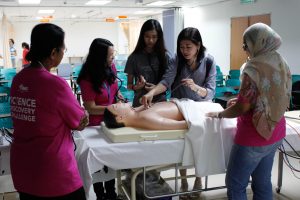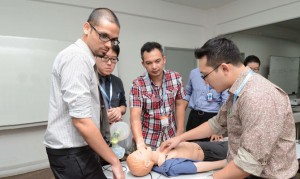Employers in general want graduates to be better prepared for the workplace resulting in universities thinking about the skills they will need to do well in a job. And it’s not just employers, students are asking to be trained to be employable too. The implications for the higher education sector are clear: create graduates who are more agile, have a solid understanding of how the workplace works and can see how their skills fit into it. This is exactly what the medical programme at the International Medical University, Malaysia has been achieving all these years – producing graduates who are technically competent and more importantly a caring doctor. Here is what Dr Wong Yih Seong who has supervised IMU graduates over the years, have to say about them.
An advantage that IMU graduates have is the extensive and expeditious clinical exposure provided by its Clinical School. Being exposed from an early stage of training to the local clinical environment is beneficial to the IMU graduate not so much because it helps them to learn how to carry out work related and clinical tasks, but primarily because it acclimatizes them to the intricacies and workings of the healthcare system very early on. Students learn how things work, why things are done in a certain way, and most importantly how to extract the most out of the system to provide the best possible care for the patients. Being involved and hands-on from the very beginning of the training enables graduates to be resourceful, to think and work systematically, and not be constrained by obstacles and limitations that would otherwise deter most others.
To many senior doctors, IMU graduates have always been considered to not just be very well trained in terms of their clinical competencies and skills, but also extremely well developed individuals and team players. Most senior doctors and employers have a hugely favourable and positive impression of IMU graduates. This overwhelmingly affirmative perception is based on their many years of experience and exposure to IMU graduates from the most junior levels (elective students, house officers, medical officers) to higher up the professional ladder (specialists and consultants).
A lot of senior doctors also regard an IMU qualification as a near certain guarantee that the doctor at hand is one who can be depended on and trusted, and more of than not this is truly the case. And while these positive preconceived perceptions can carry with it a heavy sense of expectations, IMU graduates have always thrived under this kind of pressure and done exceedingly well.  This may be due to the fact that IMU has always fosters and cultivates a healthy competitive climate that encourages its students to think ahead and work out how to best position themselves to face the challenges of the future. Most IMU graduates have very clearly defined goals and expectations of what they hope to achieve professionally, and they are very motivated towards achieving those targets. Most importantly, IMU has always, and should continue to, develop its students to be vigilant of the subtle shifts in the growth and evolution of the healthcare landscape, and to be flexible and ambitious enough to adapt to those changes.
This may be due to the fact that IMU has always fosters and cultivates a healthy competitive climate that encourages its students to think ahead and work out how to best position themselves to face the challenges of the future. Most IMU graduates have very clearly defined goals and expectations of what they hope to achieve professionally, and they are very motivated towards achieving those targets. Most importantly, IMU has always, and should continue to, develop its students to be vigilant of the subtle shifts in the growth and evolution of the healthcare landscape, and to be flexible and ambitious enough to adapt to those changes.


